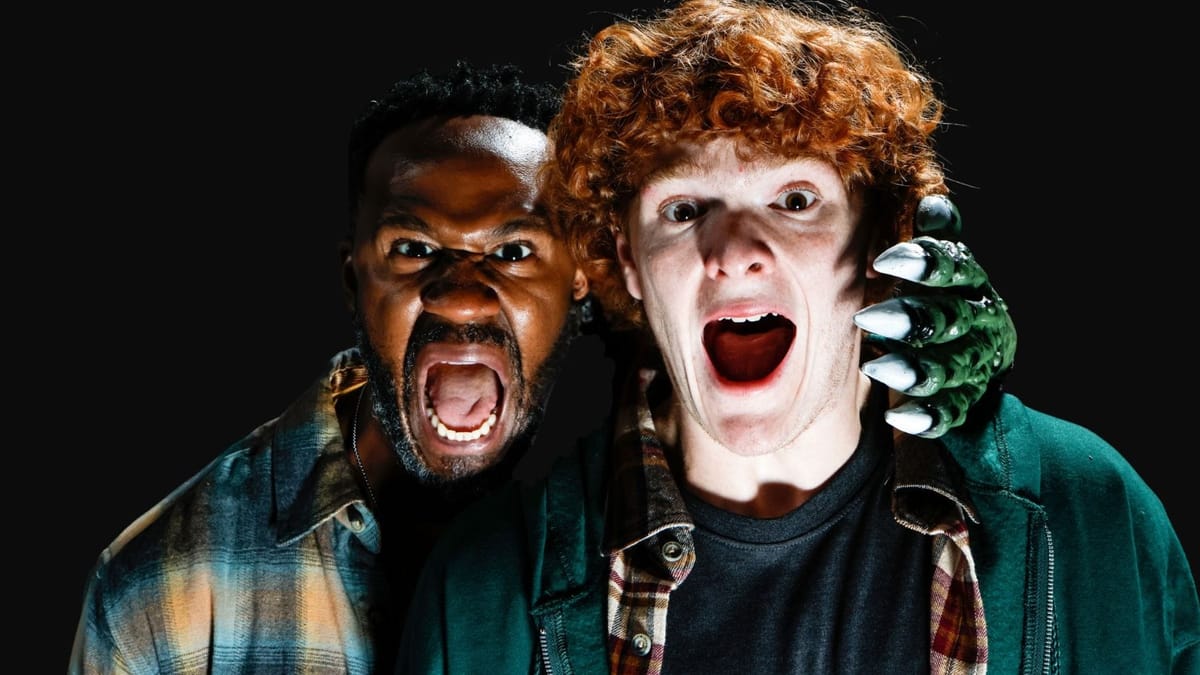Monsters, Meet the Mirror

Inside Urbanite Theatre’s fearless new horror story about grief, family, and the monsters we make of each other
By Avery Anderson
Rehearsal breaks look a little different when your job is to crawl across the floor as a monster. Director Summer Wallace laughs describing it — “we wear knee pads to protect ourselves," she says. This show isn’t just physically brutal. It’s emotional open-heart surgery.
In Monsters of the American Cinema, opening Halloween night at Urbanite Theatre, Tyler Gevas plays Pup — a white teenage boy being raised by his late father’s Black widower, Remy (played by Jon Joseph Gentry). Together, they run a drive-in theater and wrestle with grief, identity, and all the things they can’t say out loud.
Gentry calls the play “an act of resistance.” He flew in from Los Angeles — where, as he puts it, “the world’s literally been on fire all year” — to perform it in Florida. “It felt like the least I could do,” he says. “All art should move the world forward, even if it’s just by ripping the Band-Aid off.”
That tension — between horror and heart — runs through every inch of the piece. “You’ll laugh, you’ll cry, you’ll be scared,” Gevas says. “Then all hell breaks loose.”
“The all-star game of theater”
Both actors describe rehearsals as a blur of sweat, trust falls, and gallows humor. “We’ve created this container of support,” Gentry says. “We can risk emotionally and physically. We can make wild artistic choices, fall on our faces, and still feel safe.”
It helps that their director, Summer Wallace, treats rehearsal like both laboratory and therapy session. “There’s tough material in here — racial slurs, homophobic language,” she says. “We talk about when to take off that Band-Aid and when to put it back on. The goal is to keep everyone human.”
By the end of the first read-through, both actors were wrecked. “We were just reading the words on the page,” Gentry says. “When the set, the lights, the audience energy hit — it’s going to be a tidal wave.”
And that’s exactly how Wallace wants it. “This play goes from direct address to scene work to moments where the world breaks open,” she says. “It’s funny, it’s wild, and then suddenly it knocks the wind out of you.”
Why Florida, why now
Wallace first found Monsters during the height of COVID, when “the only safe stage was outdoors.” She staged a reading under the Spanish moss at Historic Spanish Point — and couldn’t shake it afterward. “It’s about found family,” she says. “About the families that don’t look like they do in Hallmark commercials. That felt urgent — especially in Florida, especially now.”
She’s right: it’s hard to think of a play more suited to this moment. In a state where conversations about race, gender, and identity often get legislated instead of lived, Monsters feels quietly subversive. It’s a story about empathy, told through the language of horror.
“This isn’t comfort food,” Gentry admits. “It’s more like soul food with a kick.”
The drive-in as confession booth
At Urbanite, there’s no hiding from the audience — or each other. “The audience is always a third character,” Wallace says. “You can see everyone’s faces, even when the lights go down.”
That intimacy becomes part of the play’s rhythm. “We talk directly to the audience,” Gevas says. “It’s like they’re sitting in the Good Time Drive-In with us.”
And Wallace can’t wait for the chaos that will come with that. “I’m not watching the play on opening night,” she laughs. “I’m watching the audience. I want to hear someone scream at a jump scare, then hear the rest of the audience laugh at that.”
Her advice for newcomers? “Treat it like the drive-in,” she says. “Grab a friend, wear your flip-flops, bring your curiosity. Don’t overthink it. Just come have a good time — and maybe see yourself in the monsters.”
If you go
Monsters of the American Cinema
By Christian St. Croix | Directed by Summer Wallace
Oct. 31 – Dec. 7 at Urbanite Theatre, Sarasota
Tickets $44 standard / $30 under 40 / $5 student
Talkback Thursdays throughout the run
Content warning: racial and homophobic language, mentions of suicide and substance abuse, strobe effects, and loud sounds.
